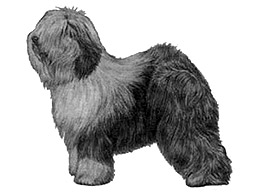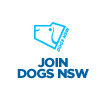Breed standards
Old English Sheepdog
Breed standards are the official guidelines that describe the ideal characteristics, temperament, and appearance of a breed and ensures that the breed is fit for function with soundness essential.

Pre 1987 Kennel Club, London
A strong, compact-looking dog of great symmetry; absolutely free of legginess; profusely coated all over. All round he is a thick-set, muscular, able-bodied dog, with a most intelligent expression, free of all Poodle or Deerhound character.
The dog stands lower at the shoulders than the loin. When walking or trotting has a characteristic ambling or pacing movement. His bark should be loud with a peculiar "pot-casse" ring in it.
(There is no specification for temperament.)
Skull capacious and rather squarely formed, giving plenty of room for brain power. The parts over the eyes should be well arched and the whole well-covered with hair. Jaw fairly long, strong, square and truncated; the stop should be defined to avoid a Deerhound face. Nose always black, large and capacious.
Dark or wall eyes are to be preferred.
Small and carried flat to side of head, coated moderately.
Teeth strong and large, evenly placed and level.
The neck should be fairly long, arched gracefully, and well coated with hair.
The forelegs should be dead straight, with plenty of bone, holding the body well from the ground, without approaching legginess, well coated all round. The shoulders sloping and narrow at the points, the dog standing lower at the shoulders than at the loin.
Rather short and very compact, ribs well sprung and brisket deep and capacious. The loin should be very stout and gently arched.
The hindquarters should be round and muscular, hocks well let down and the hams densely coated with a thick, long jacket in excess of that of any other part of the body.
Small, round; toes well arched, and pads thick and round.
Docked: Previously completely docked.
Undocked: Natural carriage. Well feathered with abundant, hard-textured coat. Can be naturally bobtail.
Very elastic in gallop but in walking or trotting has a characteristic ambling or pacing movement.
Profuse and of good hard texture; not straight, but shaggy and free from curl. The undercoat should be a waterproof pile when not removed by grooming.
Any shade of grey, grizzle, blue or blue merle, with or without white markings; any shade of brown or sable to be considered distinctly objectionable and not to be encouraged.
56 cms (22 ins) and upwards for dogs, slightly less for bitches. Type, symmetry and character of the greatest importance and on no account to be sacrificed to size alone.
Any departure from the foregoing points should be considered a fault and the seriousness with which the fault should be regarded should be in exact proportion to its degree and its effect upon the health and welfare of the dog.
A long narrow head.
Male animals should have two apparently normal testicles fully descended into the scrotum.



